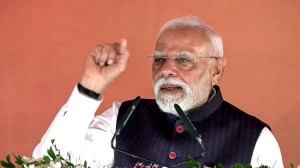Lieutenants of the lathi
His white beard quivers as he tells you about Chhotu, the police informer who was shot dead by Naxalites. ‘‘It was a cloudy mornin...

His white beard quivers as he tells you about Chhotu, the police informer who was shot dead by Naxalites. ‘‘It was a cloudy morning…they came and sprayed him with bullets.’’
Chowkidar Sarwan Singh’s hazel eyes light up with a thousand memories as he revisits that cold evening in 1964 when his village Thikriwala in Khamanno saw the charge of khaki brigade led by an Inspector General of Police. It was his finest hour. He, Sarwan, was the cynosure of all eyes as he served the IGP. ‘‘That night I cooked food for 100 people,’’ he lets the quilt slip. Today this 80-year-old who donned the mantle of a chowkidar 55 years ago is bedridden. And his son Labh Singh has already shrugged off the hereditary title given to his ancestors way back in 1876 when the Punjab Chowkidara Rules were scripted.
There are many others like him, all set to give a quiet burial to this hoary institution. ‘‘Things are not the same,’’ Sarwan swallows. Increasing urbanisation of villages has whittled away the chowkidar’s importance, leaving him with a frayed cloak of officialdom.
In days of yore, the chowkidar, always from the lower-caste, was the quintessential Man Friday. A messenger, guide, public crier, watchman, cook, census official, all rolled into one. ‘‘It used to fall on me to make announcements about important occasions, I still remember the peepa (tin) I used to beat,’’ Sarwan smiles.
He was also the carrier of missives, going from house to house. And when officials came visiting, he would morph into a guide, escorting them all around. He was also the man who gathered chairs and tables for functions besides keeping a record of births and deaths. All this for loads of gratitude and a few rupees — Sarwan’s grandfather was paid Rs 6, he gets Rs 400 collected as chowkidara tax from the villagers.
‘‘Today, the gratitude is missing,’’ rues Jagpal Singh, a farmer of Rai village. Slowly and surely, the chowkidar’s role has been usurped — by the loudspeaker at the village gurdwara which is used for making announcements; by the sarpanch who is happy to chaperone officials; by the anganwadi worker who also records births.
‘‘With more and more births taking place in hospitals, I end up recording the few that take place here,’’ says Dalbara Singh, the chowkidar at Rai village, who still dutifully visits the local thana every month to deposit his census records.
There are other errands too that this frail 48-year-old with a beard snaking down to his waist, continues to run. ‘‘I have to arrange men for pehra (watch) by rotation. Which means I give them a reminder every day,’’ he says. He also has to be at the beck and call of officials. And death records, which hasn’t found any other taker.
Though it’s just been six years since his father passed on the baton to him, Dalbara is already fed up. ‘‘I have no time for dehaari now, I am reduced to grazing cows,’’ he sighs.
Though the Amarinder Government has now decided to hike his monthly pay to Rs 600, he isn’t sure whether the villagers would be willing to pay. His fears aren’t unfounded. In Nawanshehar district, professional watchmen are fast replacing the pehras kept by villagers. Worse, a woman in the neighbouring Chari village, which has also employed a younger upper-caste watchman, thinks this institution is already dead. ‘‘Err… I thought we employed them,’’ her voice trails off.
Now that would have broken Sarwan’s heart.





- 015 hours ago
- 0214 hours ago
- 0314 hours ago
- 0414 hours ago
- 0514 hours ago


























